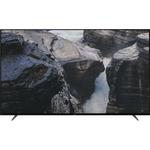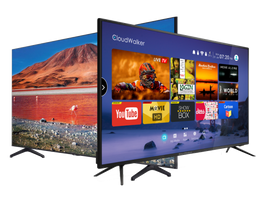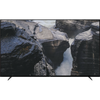A comparison of specs, key information, reviews, and best pricing from top retailers
Last updated -- hours ago | Report incorrect information
What we think

The PerfectRec TV team Learn more
Updated January 10, 2024·
If you're looking for a more budget-friendly option, the Samsung Q60C is significantly less expensive and performs adequately, especially for viewing news, talk shows, reality TV, and using as a monitor. However, it's not ideal for dark rooms and gaming where performance is average. On the other hand, the Sony X90K, while more expensive, offers better overall picture quality, higher performance for movies, sports, and gaming, and improved brightness for both standard and high dynamic range content. It's better suited for bright rooms and offers a great experience across various content types, but comes at a higher cost. Give Feedback
this description is based on the product variant with some specs and product variant with some specs. At the time of writing, the variant with some specs cost some dollars and the variant with some specs cost some dollars.
Advantages of the Samsung Q60C (LCD)
- The Samsung Q60C (LCD) has no clear advantages over the Sony X90K (LCD).
Advantages of the Sony X90K (LCD)
- Very good for bright room
- Good for dark room
- Very good for gaming
- Good for movies & TV
- Good for sports
- Very good for news, talk, & other TV
- Very good for cartoons & animation
- Good for use as monitor
- Best in class for upscaling
- Best in class motion processing
Key differences
Picture Quality
6.0


7.7
5.55/10
CONTRAST
7.38/10
7.3/10
COLOR VOLUME SCORE
7.8/10
LED
PANEL TYPE
LED FALD
VA
PANEL SUB-TYPE
TBD
The Sony X90K (LCD) has good picture quality, while the Samsung Q60C (LCD) has only fair picture quality.
Movies & TV
5.5


7.5
5.55/10
CONTRAST
7.38/10
2.9/10
BLACK UNIFORMITY
6.1/10
6.6/10
UPSCALING
10.0/10
Yes
HDR10 SUPPORT
Yes
Yes
HDR10+ SUPPORT
No
No
DOLBY VISION SUPPORT
Yes
The Sony X90K (LCD) is good for movies & TV, while the Samsung Q60C (LCD) is poor.
The Sony X90K is good for watching movies because it has a high contrast ratio and effective local dimming which enhances black uniformity, crucial for dark scenes in movies. In contrast, the Samsung Q60C performs poorly in these areas, displaying less contrast and weaker local dimming, leading to grayer blacks that diminish movie-watching experiences.
Sports
6.5


7.1
8.0/10
MOTION PROCESSING
10.0/10
60Hz
REFRESH RATE
120Hz
10.0/10
INPUT LAG SCORE
7.0/10
6.6/10
UPSCALING
10.0/10
7.9/10
SDR BRIGHTNESS SCORE
8.7/10
Yes
HLG SUPPORT
Yes
The Sony X90K (LCD) is good for sports, while the Samsung Q60C (LCD) is only fair.
The Sony X90K provides a better experience for watching sports due to its superior response time and motion processing compared to the Samsung Q60C, which are very important for displaying fast action clearly without blurring. Both TVs are similar in their handling of reflections and almost equal in their viewing angles, but these factors are less critical for sports watching than motion performance.
Gaming
5.7


8.1
5.2/10
RESPONSE TIME SCORE
8.0/10
10.0/10
INPUT LAG SCORE
7.0/10
8.0/10
MOTION PROCESSING
10.0/10
30.0/100
GAMING LOCAL DIMMING
76.0/100
6.1/10
GAME HDR BRIGHTNESS SCORE
8.6/10
The Sony X90K (LCD) is very good for gaming, while the Samsung Q60C (LCD) is poor.
The Samsung Q60C has a faster input lag which is beneficial for gaming responsiveness; however, its poorer response time can lead to more motion blur in fast-paced games when compared to the Sony X90K, which has very good response time minimizing blur, making it better suited for dynamic gaming experiences.
News, Talk, & Other TV
6.8


8.7
7.9/10
SDR BRIGHTNESS SCORE
8.7/10
6.6/10
UPSCALING
10.0/10
The Sony X90K (LCD) is very good for news, talk, & other TV, while the Samsung Q60C (LCD) is only fair.
The Sony X90K provides a very good SDR brightness level and has effective local dimming, which enhances contrast and gives more life-like and deeper colors, making it well-suited for watching news and TV programs in various lighting conditions. In contrast, the Samsung Q60C, while offering very good upscaling that will maintain clarity even with low-resolution content, has a lower contrast ratio and poor local dimming performance, which may lead to less vibrant images especially in dark scenes.
Bright Room
6.5


8.0
5.3/10
VIEWING ANGLE
5.4/10
7.9/10
SDR BRIGHTNESS SCORE
8.7/10
5.7/10
HDR BRIGHTNESS SCORE
8.3/10
6.3/10
REFLECTIONS SCORE
6.3/10
The Sony X90K (LCD) is very good for bright room, while the Samsung Q60C (LCD) is only fair.
Cost
$749


$998
$200
$400
$600
$800
$1,000
$1,200
$1,400
$1,600
The Samsung Q60C (LCD) has a price of $749 and the Sony X90K (LCD) costs $998.

Let Us Help Find Your Perfect TV
Find your new TV
Key similarities
Cartoons & Animation
7.5


8.0
7.3/10
COLOR GAMUT SCORE
7.7/10
7.3/10
COLOR VOLUME SCORE
7.8/10
7.9/10
SDR BRIGHTNESS SCORE
8.7/10
7.8/10
COLORS OUT OF THE BOX SCORE
7.0/10
7.0/10
GRAY UNIFORMITY
6.6/10
Although they have very similar scores, PerfectRec considers Sony X90K (LCD) to be very good for cartoons & animation, while the Samsung Q60C (LCD) is good.
The Samsung Q60C provides good colors out of the box and a good color gamut which are important for watching cartoons and animation, ensuring that the images are vibrant and true to the original content. In contrast, the Sony X90K offers very good performance in these same categories, meaning it may display even more accurate and bright colors, making it more suitable for animated content where these qualities are very important.
Give feedback
We’re constantly working to improve.
How the Samsung Q60C (LCD) and the Sony X90K (LCD) compare to other TVs
Spec Comparison
| Samsung Q60C (LCD) | Sony X90K (LCD) |
GENERAL | |||
|---|---|---|---|
| Price | |||
$749 | $998 | ||
Brand | |||
Brand | Samsung | Sony | |
Release Date | |||
Release Date | April 5, 2023 | May 2, 2022 | |
Full name | |||
Full name | QN65Q60C | XR-65X90K | |
Screen Size | |||
Screen Size | 65" | 65" | |
Screen Resolution | |||
Screen Resolution | 4K | 4K | |
TV FEATURES | |||
|---|---|---|---|
Operating System | |||
Operating System | Tizen | Android TV | |
Sound Quality Score | |||
Sound Quality Score | 6.6/10 | 8/10 | |
NextGen Ready | |||
NextGen Ready | No | Yes | |
HDMI Ports | |||
HDMI Ports | 3 | 4 | |
Coax Ports | |||
Coax Ports | 1 | 1 | |
DISPLAY QUALITY SCORES | |||
|---|---|---|---|
Picture Quality Score | |||
Picture Quality Score | 6.1/10 | 7.7/10 | |
Bright Room Score | |||
Bright Room Score | 6.5/10 | 8/10 | |
Gaming Score | |||
Gaming Score | 5.7/10 | 8.1/10 | |
Movies & TV Score | |||
Movies & TV Score | 5.5/10 | 7.5/10 | |
Sports Score | |||
Sports Score | 6.5/10 | 7.2/10 | |
PHYSICAL | |||
|---|---|---|---|
Dimensions w/o Stand (H x W x D) | |||
Dimensions w/o Stand (H x W x D) | 32.7" x 57.1" x 1" | 32.8" x 57.2" x 2.8" | |
Dimensions with Stand (H x W) | |||
Dimensions with Stand (H x W) | 34.3" x 57.1" | 34" x 57.2" | |
Weight without Stand | |||
Weight without Stand | Unknown | 50.5 lbs | |
VESA Mount | |||
VESA Mount | 400 x 300 | 300 x 300 | |
DISPLAY | |||
|---|---|---|---|
Color Depth | |||
Color Depth | 10 bit | 10 bit | |
Black Frame Insertion | |||
Black Frame Insertion | Yes | Yes | |
Auto Low Latency Mode | |||
Auto Low Latency Mode | Yes | Yes | |
Contrast | |||
Contrast | 5.6/10 | 7.4/10 | |
Local Dimming | |||
Local Dimming | 4.1/10 | 7.2/10 | |
SOUND | |||
|---|---|---|---|
Speaker Setup | |||
Speaker Setup | 2.0 | 2.0 | |
Speaker Power | |||
Speaker Power | 20 W | 30 W | |
Dolby Atmos | |||
Dolby Atmos | Yes | Yes | |
DTS:X | |||
DTS:X | No | Up to DTS Digital Surround, Bypass only | |
Shopping
Sony X90K (LCD)
See more
Dig into reviews and images
Techradar
Al Griffin | December 2022
"As Sony’s next-to-flagship LCD TV, the X90K series delivers impressive performance for the price. The XR90K had fairly accurate out-of-box color. The TV’s multi-position stand lets you either set the screen flush with any stand its mounted on or elevate it to clear space for a soundbar. With the latter option, you get around 3 inches of clearance enough to accommodate most soundbars. The X90K’s excellent suite of gaming features ranks it up there with the best 120 Hz 4K TVs."
Get a great deal on the Samsung Q60C (LCD) or the Sony X90K (LCD)
About Samsung
Samsung, a South Korean electronics manufacturer, holds the title of being the largest global TV vendor in terms of units sold. They offer a diverse lineup of TV products that cater to various budget ranges. A notable achievement in recent years is the development of Quantum Dots, a technology that enhances color reproduction, resulting in richer and more vibrant hues. Samsung TVs are well-regarded for their high manufacturing quality and user-friendly software, making them an excellent choice for consumers seeking an intuitive viewing experience.
About Sony
Sony stands as a highly experienced and widely trusted TV manufacturer, earning a reputation that surpasses all others. A Japanese company, Sony has been making TVs for far longs than it has been making Playstation game consoles. Sony's high-end TVs are often regarded as the ultimate choice for videophiles, representing the epitome of quality, albeit at a premium price point. Renowned for their advanced and precise motion handling, as well as their cutting-edge local dimming algorithms, Sony consistently delivers unparalleled performance in these areas. They include Google TV software with all their TV sets, which grants access to the largest selection of apps available and they also include Bravia Core which is a movie streaming platform specifically for Sony TVs that offers higher picture quality by using more bandwidth.
Give feedback
We're constantly perfecting our model
TV guides you might be interested in
More comparisons for you
Compare Samsung Q60C (LCD) vs. Vizio V-Series '22 (LCD)
VS
Compare Samsung Q60C (LCD) vs. Vizio M-Series (LCD)
VS
Compare Samsung Q60C (LCD) vs. Amazon Omni Series (LCD)
VS
Compare Sony X90K (LCD) vs. Sony X90J (LCD)
VS
Compare Sony X90K (LCD) vs. Vizio P-Series (LCD)
VS
Compare Sony X90K (LCD) vs. Samsung Q80B (LCD)
VS
FAQs
FAQs about TVs
Why trust us
This information was produced and vetted by the PerfectRec TVs team. We are a product research and recommendation organization that meticulously reviews and evaluates the latest TV information and makes it digestible for you.
By the numbers
385
TVs evaluated
33,110
TVs stats compiled
21
Proprietary TVs ratings developed
122,430
Recommendations made
18,365
Consumer hours saved
About the TV team
Joe Golden, Ph.D
CEO and TVs Editor
Joe is an entrepreneur and lifelong electronics enthusiast with a Ph.D in Economics from the University of Michigan.
Jason Lew
Staff Expert & Software Engineer
Jason is a staff expert and software engineer that has been making laptop recommendations for 7 years and moderates one of the largest laptop subreddits.
Chandradeep Chowdhury
Staff Expert & Software Engineer
Chandradeep is a staff expert and software engineer and expert in televisions and monitors. He’s been making monitor recommendations for ten years.
Jaime Roldán
TVs Expert
Jaime is a Colombia-based TV expert. He is an electronics engineer with 8 years of experience in the telecom sector and has been making TV recommendations for 12 years.







